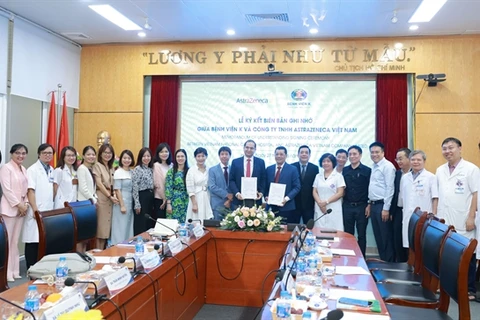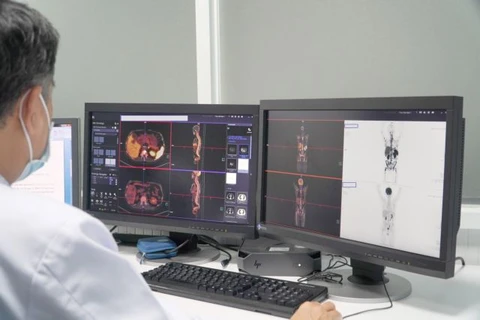
Hanoi (VNS/VNA) - “VISTA-1 marks a major step forward in the battle against cancer,” said Dr Phuong Le Tri, Chief Operating Officer of TAMRI.
“This promising drug offers invaluable opportunities for Vietnamese patients while enabling our doctors and scientists to contribute to the advancement of drug research.”
Developed by US-based biotech company Riboscience, RBS2418 targets advanced colorectal cancer, offering new hope for terminal cancer patients in Vietnam. The trial received approval from the U.S. Food and Drug Administration (FDA) in September 2024, followed by approval from Vietnam’s Ministry of Health in December.
Cancer is one of the leading causes of death in Vietnam, claiming over 120,000 lives annually. Colorectal cancer, in particular, is on the rise and is projected to increase significantly in the coming decades. According to the International Agency for Research on Cancer (IARC), colorectal cancer mortality rates in Asia could rise by nearly 80% by 2045.
Late-stage diagnoses, which account for 15-30% of colorectal cancer cases in Vietnam, pose significant treatment challenges, with survival rates as low as 10-20%. While targeted therapies and immunotherapies have improved survival rates to 30–40%, many patients remain unresponsive to existing treatments, highlighting the urgent need for innovative solutions.
RBS2418, an oral immunotherapy drug, represents a potential breakthrough for patients with advanced colorectal cancer. Unlike conventional treatments, RBS2418 works by activating the immune system to recognise and destroy cancer cells. Specifically, it transforms the tumour's immune environment from “cold”—where immune activity is suppressed—to “hot,” enabling a stronger immune response.
Developed by a team of renowned researchers, including Stanford University’s Prof Jeffrey S. Glenn and Riboscience’s Klaus Klumpp, the drug has shown promising results in early trials. Phase 1 trials in the US confirmed the drug’s safety, while preliminary data suggests it has anti-tumour activity, both as a standalone treatment and in combination with PD-1 checkpoint inhibitors.
Prof Glenn highlighted the significance of international collaboration, stating: “The VISTA-1 study will provide critical data to evaluate RBS2418’s efficacy. Collaborating with Vietnamese researchers is invaluable, and we are excited to work together to advance cancer treatment.”
Tam Anh General Hospital and TAMRI have made substantial investments in the VISTA-1 trial, including the establishment of a state-of-the-art laboratory as a central testing hub, operating alongside US-based research labs. Vietnamese doctors have worked closely with US specialists to develop the Phase 2 study protocol and implement standardised procedures.
Vietnam’s participation in this trial underscores its readiness to contribute to advanced medical research.
The announcement, made at an event attended by representatives from the Ministry of Health, the Ministry of Foreign Affairs, and the US Centres for Disease Control and Prevention (CDC), highlights Vietnam’s growing role in global medical research. The VISTA-1 trial is expected to offer advanced treatment options for Vietnamese patients while enhancing the country’s capacity to conduct cutting-edge clinical trials.
Representatives from the Ministry of Health emphasised that the trial provides equal access to groundbreaking treatments for Vietnamese patients and strengthens Vietnam’s position within the global medical community.
The VISTA-1 trial marks a significant milestone for Vietnam’s medical field. It is the country’s first Phase 2A clinical trial for colorectal cancer treatment and introduces a new biomarker assay technique, which will be implemented at central laboratories across Vietnam, eliminating the need to send samples abroad.
While Vietnam has traditionally participated in late-stage trials, such as Phase 3, it is now taking an active role in early-stage research.
By participating in international trials like VISTA-1, Vietnam is advancing its healthcare capabilities and creating opportunities for its medical community to engage in high-impact global research.
“Normally, such studies are conducted in the US, so we are very excited to include Vietnam in this innovative study, which I believe will play a key role in defining the future of cancer treatment,” Prof Jeffrey S. Glenn stated.
Phase 2A of the trial will enrol 150 patients in both the US and Vietnam, including participants from Tam Anh General Hospitals in Hanoi and Ho Chi Minh City. The trial is expected to expand to three additional Vietnamese hospitals in the near future.
With the VISTA-1 trial now underway, patients with advanced colorectal cancer in Vietnam have new hope. If successful, RBS2418 could revolutionise the treatment of a condition that has long posed significant challenges. The trial also sets a precedent for Vietnam’s involvement in groundbreaking medical research, paving the way for future collaborations and innovations./.






















